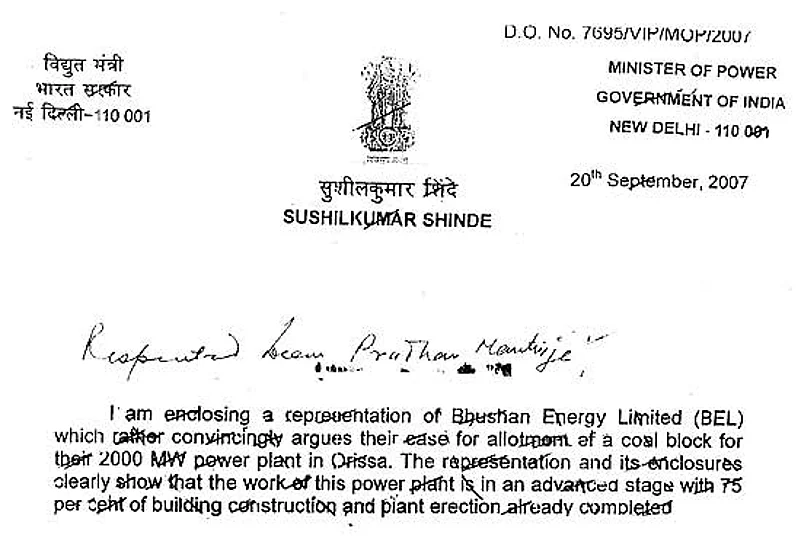Even as the news comes out in tantalising dribs and drabs, there’s no denying the continuing and adverse political fallout from Coalgate on the UPA government. Is former power minister—and current home minister—Sushilkumar Shinde going to be the latest victim of the continuing saga around discretionary allotments of coal blocks to private players?
On September 20, 2007, the then power minister wrote an impassioned letter to Prime Minister Manmohan Singh. In this letter—which Outlook has a copy of—Shinde seeks the prime minister’s intervention to get a coal block allocated for Bhushan Energy Ltd (BEL), an associate company of Brij Bhushan Singal’s Bhushan Steel Ltd, which was proposing to set up a 2,000 MW thermal power plant in Orissa.
On the face of it, there’s nothing unusual in Shinde recommending allocation of a coal block to a company which claimed it got an unfair deal from the screening committee of the Union ministry of coal. BEL claimed in a letter to Shinde three days earlier that it has tied up finances and had even gone ahead with placement of orders for the plant equipment.

Helping hand Shinde’s letter to the PM
What’s interesting is that, while seeking the PM’s intervention on behalf of BEL for allotment of the Amarkonda Murgadangal coal block in Jharkhand, the minister chose to bring up the fact that the block had been allotted to Naveen Jindal’s Jindal Steel & Power Ltd and its sister concern, Gagan Sponge Iron Pvt Ltd, on a 50:50 basis. The allocation to Gagan Sponge Iron, it should be noted, had come about only after a “review” by the screening committee. As Shinde mentions in his letter, the Central Electricity Authority had recommended that BEL be considered for 50 per cent share in the block.
In his representation, Shinde wrote: “In view of the fact that we need to allot coal blocks on priority to companies with greater preparedness, I feel that BEL should be allotted a coal block in order to quickly add generation capacity during the Eleventh Plan. I recommend that BEL be given a 50 per cent share in the Amarkonda Murgadangal coal block and the remaining 50 per cent be given to the two companies—Jindal Steel and Gagan Sponge Iron. This will ensure that the requirements of the power sector are met and none of the companies allotted blocks by the screening committee have to suffer cancellation.”
The minister goes on to add that 50 per cent coal mine capacity was sufficient to generate 1,000 MW, which is the maximum permissible for each company. The communication brings to fore several anomalies. One is the fact that the screening committee gave the block to two different companies from the same group. Did the companies not disclose their shared ownership? Shinde certainly seems to think so, saying BEL had submitted records from the Registrar of Companies to show Jindal Steel and Gagan Sponge have the same ownership.
Despite all this, Shinde’s intervention did not help BEL get half the share in the coal block. Jindal Steel and Gagan Sponge Iron still hold the block, which has estimated reserves of 410 million tonnes and remains non-operational. Interestingly, the minister chose to represent BEL, which is among those under scrutiny for not making operational the captive blocks allocated to it.


























